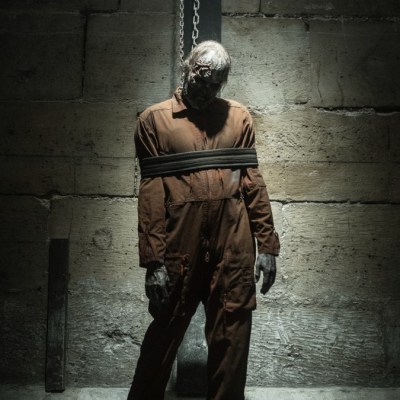Generation Z: Horror Director Ben Wheatley Teases His New Zombie Satire for Channel 4
Exclusive: Director Ben Wheatley gives us a taste of Generation Z, a new kind of zombie story for Channel 4.

This article appears in the new issue of DEN OF GEEK magazine. You can read all of our magazine stories here.
Two things to know about Ben Wheatley’s zombie horror TV show: they’re not zombies and they’re not actually dead. The six-part series from Channel 4 charts a zombie-esque outbreak in a small, rural, British town, sparking generational conflicts in the quarantined residents.
“It’s a biological weapon that has changed their biology. So it’s in the ballpark, but it’s easier to talk about it in sound bites of zombies,” says Wheatley. The director of horror hits including Kill List, High-Rise, Sightseers and, most recently, Jason Statham-starring giant shark movie Meg 2: The Trench, had been planning Generation Z for some years, with the first announcements for the show released in 2019. But then Covid hit, and that changed everything. Sort of.
“I reread it, and I thought, well, it’s weird because the original drafts of it were predictive science fiction, but now it’s happened,” says Wheatley of reanimating the show post-pandemic. “Everybody’s got the experience of it. So, in a way, with that kind of context, I went into writing the rest of it, finishing up, and I think it was for the best. It gave a much more rounded view to all the characters having been through Covid.”
In Generation Z, a spillage of some sort of chemical agent is the catalyst for the outbreak, and residents of a retirement home become the first affected. But, as Wheatley says—not zombies, not dead. In fact, these retirees are energized and ignited by the infection. They are hungry for flesh, but they are also hungry for freedom, empowerment, and independence.
As much as it’s a gruesome horror (and it is; there is plenty of gore here) and a black comedy, Generation Z is a state-of-the-nation show, with a huge cast which reflects on generational disconnects, politics, the military, class, gender, and family. Wheatley says he took inspiration from post-nuclear holocaust movie Threads (though this is nowhere near as bleak) and George A. Romero’s Dawn of the Dead (“it’s political without banging it over your head”). And yes, it’s prescient and current, with conspiracy theories about the vaccine having caused the outbreak, youngsters being radicalized online, and the cost of living crisis being very real concerns.
Wheatley has rounded up a massive multi-generational cast, including several bona fide British national treasures—Sue Johnston and Anita Dobson are among them—who get to play against type.
“I think they got to do stuff that they wouldn’t normally do on British telly. It was a stretch of the legs for them to get into all this,” says Wheatley. Without spoilers, this involves an orgy and plenty of ultra-violence.
Then, at the other end of the age spectrum, there’s the young cast. Wheatley says they saw loads of people and got their pick: “It was not really a discussion, we went, ‘Oh God, we’ve got to have them, because they’re terrific.’” This includes (among many others) Half Bad: The Bastard Son & the Devil Himself’s Jay Lycurgo, Somewhere Boy’s Lewis Gribben, and Viola Prettejohn from The Nevers. “We got to look under the hood of the next generation of British performers. I think I’ll be dipping back into Gen Z for casting for quite some time,” says Wheatley.
Though the show tackles a whole range of issues, the extended scope of TV (compared to film) was a big part of the appeal for Wheatley. “Being able to do a longform horror piece on Channel 4—that’s a big canvas,” he says. “You can actually get the advantage of television, which is to hear the characters and see them and see the challenges to them, without having to rush through. I wanted to show that kind of development, how they’re dealing with the world.”
Shot almost entirely on location over 14 weeks (the same amount of time it took to shoot Meg 2, he tells us), Wheatley promises a show that intensifies and escalates as it progresses. And could there even be scope for a second season?
“It’s all in the hands of the reviews and the audience,” says Wheatley. “I see it as changing genre each season. The zombieness of it, or whatever that is, will go away, and something else will happen. But we’ll be following these characters as they grow up.” Generation Alpha—not aliens? Only time will tell.
Generation Z premieres on Channel 4 in October.


